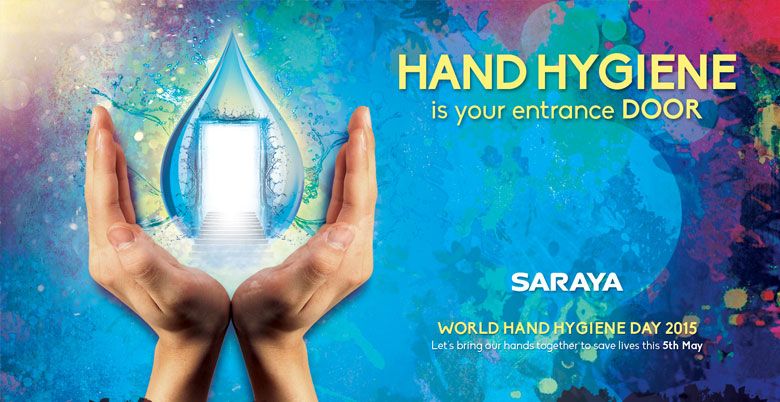- Home
- News
- Healthcare Reading Room
- Celebrate Patient Safety: SAVE LIVES: Clean Your Hands
Celebrate Patient Safety: SAVE LIVES: Clean Your Hands

Saraya Co., Ltd. is proud to support the SAVE LIVES: Clean Your Hands campaign, which is celebrated yearly on May 5th. Those familiar to trends in healthcare hygiene and patient safety will know that May 5th is the official day of celebration and affirming commitment to patient safety through hand hygiene and the use of alcohol hand rub to prevent infections and the spread of pathogens in healthcare settings.
SAVE LIVES: Clean Your Hands is part of the larger program started in 2005, WHO Clean Care is Safer Care, pioneered by Professor Didier Pittet of the Geneva University Hospital in Switzerland. Clean Care is Safer Care was created as a foundation to cultivate a global understanding of the importance of patient safety and hand hygiene to reduce infections in the hospital. The project is dedicated to gaining the acknowledgment of governments in order to promote the development of patient safety policies and programs on the country level. Since the program began 10 years ago, hospitals in over 171 countries have committed to SAVE LIVES: Clean Your Hands.
Unclean practices and insufficient hand hygiene in hospitals account for unexpected treatment, extended stays and many deaths throughout developing and developed countries worldwide. In 2002, 99,000 deaths were attributed to healthcare-associated infections (1). The burden is great, but only until recently has the real effects of insufficient hand hygiene been understood. These numbers are climbing due to antibiotic-resistant organisms.
Since 2009, SAVE LIVES: Clean Your Hands has been celebrated annually on May 5th, represents the five fingers of both hands, or 5-5. This campaign is a ground-level initiative alongside the country-level Clean Care is Safer Care program, that enrolls the support and enthusiasm of healthcare workers around the world to generate awareness and support for reducing healthcare-associated infections. "System change" and creating a culture of awareness regarding hand hygiene are pillars of the SAVE LIVES: Clean Your Hands. This year the WHO is using social media to create awareness via photos posted by supporters displaying the phrase, "#safehands". Images of supporters can be viewed at http://www.cleanhandssavelives.org/safehands/pics.php.
Professor Pittet is also challenging hospitals to record their own attempt at beating the Guinness record-holding hand hygiene relay this year. Information can be found on Youtube as well as the Clean Care is Safer Care website. SARAYA, the leader in healthcare hygiene in Japan, is proud to support and publicize this year's May 5th SAVE LIVES: Clean Your Hands campaign, and our offices worldwide are excited to participate in May 5th activities at local hospitals. SARAYA'S website for May 5th is available at https://saraya.world/healthcare/pages/clean-your-hands-5-may for downloadable posters and a screensaver to support this year's activities.
As on of the WHO's initial members of the POPs committee, SARAYA is dedicated to the SAVE LIVES: Clean Your Hands, and the active role the group takes in bringing hand hygiene to developing countries. The goal of POPs is to create collaboration between businesses for the sustainable good of spreading knowledge and opportunities for hand hygiene to developing countries. President Yusuke Saraya of Saraya Co., Ltd. has kept this policy in the creed of the company. "The only way to achieve change and a sustainable society is through collaboration between businesses and the non-profit sector. POPs reflects this ideal, just as SARAYA believes this to be the basis for its CSR projects," said Yusuke Saraya while visiting Cambodia to witness the signing in of the Ministry of Health's pledge to become a supporting member of the SAVE LIVES: Clean Your Hands Campaign.
1. Stone PW, Braccia D, Larson E. Systematic review of economic analyses of healthcare-associated infections. American Journal of Infection Control, 2005, 33:501–509.
Improving the sanitation, the environment, and health of the world.
Social

© Copyright Saraya.Co.Ltd 2023 All rights reserved.